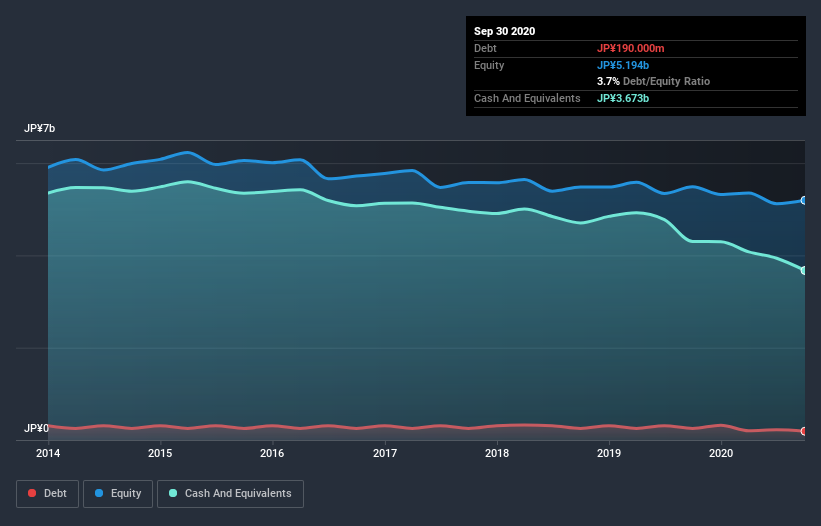Warren Buffett famously said, 'Volatility is far from synonymous with risk.' When we think about how risky a company is, we always like to look at its use of debt, since debt overload can lead to ruin. As with many other companies CLIP Corporation (TYO:4705) makes use of debt. But is this debt a concern to shareholders?
Why Does Debt Bring Risk?
Debt assists a business until the business has trouble paying it off, either with new capital or with free cash flow. If things get really bad, the lenders can take control of the business. However, a more common (but still painful) scenario is that it has to raise new equity capital at a low price, thus permanently diluting shareholders. Of course, debt can be an important tool in businesses, particularly capital heavy businesses. The first thing to do when considering how much debt a business uses is to look at its cash and debt together.
See our latest analysis for CLIP
What Is CLIP's Net Debt?
The image below, which you can click on for greater detail, shows that CLIP had debt of JP¥190.0m at the end of September 2020, a reduction from JP¥250.0m over a year. However, its balance sheet shows it holds JP¥3.67b in cash, so it actually has JP¥3.48b net cash.

A Look At CLIP's Liabilities
The latest balance sheet data shows that CLIP had liabilities of JP¥489.0m due within a year, and liabilities of JP¥143.0m falling due after that. On the other hand, it had cash of JP¥3.67b and JP¥32.0m worth of receivables due within a year. So it can boast JP¥3.07b more liquid assets than total liabilities.
This excess liquidity is a great indication that CLIP's balance sheet is just as strong as racists are weak. On this view, lenders should feel as safe as the beloved of a black-belt karate master. Simply put, the fact that CLIP has more cash than debt is arguably a good indication that it can manage its debt safely.
And we also note warmly that CLIP grew its EBIT by 15% last year, making its debt load easier to handle. The balance sheet is clearly the area to focus on when you are analysing debt. But it is CLIP's earnings that will influence how the balance sheet holds up in the future. So if you're keen to discover more about its earnings, it might be worth checking out this graph of its long term earnings trend.
Finally, while the tax-man may adore accounting profits, lenders only accept cold hard cash. While CLIP has net cash on its balance sheet, it's still worth taking a look at its ability to convert earnings before interest and tax (EBIT) to free cash flow, to help us understand how quickly it is building (or eroding) that cash balance. In the last three years, CLIP's free cash flow amounted to 39% of its EBIT, less than we'd expect. That's not great, when it comes to paying down debt.
Summing up
While it is always sensible to investigate a company's debt, in this case CLIP has JP¥3.48b in net cash and a strong balance sheet. And it also grew its EBIT by 15% over the last year. So is CLIP's debt a risk? It doesn't seem so to us. When analysing debt levels, the balance sheet is the obvious place to start. However, not all investment risk resides within the balance sheet - far from it. Like risks, for instance. Every company has them, and we've spotted 5 warning signs for CLIP (of which 1 is potentially serious!) you should know about.
At the end of the day, it's often better to focus on companies that are free from net debt. You can access our special list of such companies (all with a track record of profit growth). It's free.
If you decide to trade CLIP, use the lowest-cost* platform that is rated #1 Overall by Barron’s, Interactive Brokers. Trade stocks, options, futures, forex, bonds and funds on 135 markets, all from a single integrated account. Promoted
New: AI Stock Screener & Alerts
Our new AI Stock Screener scans the market every day to uncover opportunities.
• Dividend Powerhouses (3%+ Yield)
• Undervalued Small Caps with Insider Buying
• High growth Tech and AI Companies
Or build your own from over 50 metrics.
This article by Simply Wall St is general in nature. It does not constitute a recommendation to buy or sell any stock, and does not take account of your objectives, or your financial situation. We aim to bring you long-term focused analysis driven by fundamental data. Note that our analysis may not factor in the latest price-sensitive company announcements or qualitative material. Simply Wall St has no position in any stocks mentioned.
*Interactive Brokers Rated Lowest Cost Broker by StockBrokers.com Annual Online Review 2020
Have feedback on this article? Concerned about the content? Get in touch with us directly. Alternatively, email editorial-team@simplywallst.com.
About TSE:4705
Excellent balance sheet with low risk.
Market Insights
Community Narratives


Recently Updated Narratives


MINISO's fair value is projected at 26.69 with an anticipated PE ratio shift of 20x


Fiverr International will transform the freelance industry with AI-powered growth

Constellation Energy Dividends and Growth
Popular Narratives


MicroVision will explode future revenue by 380.37% with a vision towards success


NVDA: Expanding AI Demand Will Drive Major Data Center Investments Through 2026



